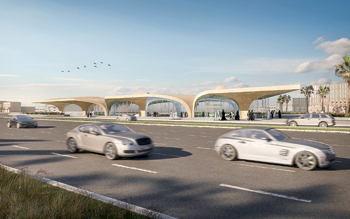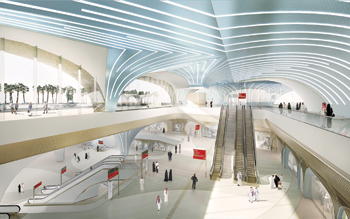Qatar Rail project gathers steam
01 March 2015
Qatar's ambitious rail project has gathered steam with country poised to award a number of important contracts this year for the project, which is seen as a backbone in the country’s developing infrastructure.
A clear indication of its intent is the award of yet another component of the project, with a letter of conditional acceptance last month (February) for an estimated $3.36-billion deal to a consortium consisting of Mitsubishi Heavy Industries, Mitsubishi Corporation, Hitachi, Kinki Sharyo Company, and Thales from Qatar Rail for a systems package for the Doha Metro.
The package calls for turnkey construction of a fully automated driverless metro system, which will included 75 sets of three-car trains, platform screen doors, tracks, a railway yard, and systems for signalling, power distribution, telecommunications and tunnel ventilation. The package also includes a maximum of 20-year maintenance services for the metro system after its completion.
Mitsubishi Heavy Industries, the leader of the consortium, will supply the power distribution system, platform screen doors, tracks and tunnel ventilation work, and will also undertake overall project management and system integration. Mitsubishi Corporation and Kinki Sharyo will jointly provide the railway cars. Thales will supply the advanced Communications Based Train Control (CBTC) signalling, telecommunications and security, integrated operational control centre and automatic fare collection systems. And Hitachi will perform some project management duties and also handle facilities maintenance, including the supply of special maintenance vehicles that comprehensively inspect the safety of infrastructure such as railway tracks and electric train lines.
Qatar Rail’s CEO Saad Ahmed Al Muhannadi says the ongoing works on Doha Metro are being done according to “our timeline that we set at the beginning of the project”.
Commenting on the latest agreement, he says: “In 2013 and 2014, we signed many agreements that reached a remarkable value promising to deliver the best standards of metro railway in the near future. Today, with the five-member Japan consortium led by Mitsubishi Heavy Industries, we look forward to add more value to our project knowing the international expertise of the Japanese and provide Doha with a fully secure and automated driverless metro system.”
The Doha Metro – one of the world’s largest projects for a single metro system – is one of four rail initiatives to be known as the Qatar Rail Development Programme (QRDP) by the Qatar Railways Company (Qatar Rail). The initiative will play a vital role in helping the country achieve its 2030 vision by providing support to the existing public transport infrastructure with a new world-class mode of transport. Qatar Rail has to date awarded more than $32 billion in contracts with the aim of delivering one of the most sophisticated rail networks in the Middle East region.
The metro will be undertaken in three phases with Phase One consisting of initial network scheme, Phase Two involving extension of network, and Phase Three will be to safeguard future corridors. It will consist of four lines (Red, Green, Gold and Blue) and extend over a length of 216 km covering the greater Doha area and include connections to town centres and vital commercial and residential areas throughout the city. In central Doha, the metro will be underground, whilst at the outskirts it will mainly be at ground level or elevated. There will be 106 stations built for the entire metro network and these will include two major stations built at Msheireb and Education City.
 |
|
There will be stations at major points. |
The system is also expected to be a key transport link between stadiums and facilities during the 2022 World Cup, which Qatar will host.
Contracts have already been awarded for the Red, Green and Gold lines. Last year, UK-based design, engineering and consulting firm WS Atkins was appointed lead designer for the Gold Line under a $135-million contract. Atkins was appointed by the consortium of contractors which is delivering the Gold Line, comprising Greek contractor Aktor, Yapi Merkezi and STFA from Turkey, India’s Larsen & Toubro and local Qatari company Al Jaber Engineering.
The Gold Line is believed to be the most challenging of the five contract packages to be awarded for Phase One of the Doha Metro, which is set for completion in 2019. The other four contract packages – Red Line North, Red Line South, Green Line and major stations, were awarded in May 2013 under deals worth a combined $8.2 billion (see Regional News).
The QRDP will consist of the Doha Metro; long distance including passenger rail and freight rail; and light rail transit (LRT).
Meanwhile, Qatar Rail is also believed to have initiated a prequalification process last month for the long-distance freight and high speed passenger rail, with a tender for Phase One of the project to be released in the middle of the year.
A spokesman for the company comments: “Qatar Rail had already conducted a prequalification process for this project early 2014. Since the tender is now scheduled for release mid-2015, there is a need to repeat the process. Also this time, the new prequalification process is limited to the civil contractors. The systems component will be contracted as a subcontract under the civil works contract.”
The 510-km long-distance freight and passenger rail network will be an integral part of the overall GCC railway network linking Qatar with Saudi Arabia and Bahrain.
Phase One of the project consists of design and construction of an operational slab track railway using diesel rolling stock. The passenger line will link Doha International Station to Saudi Arabia at Abu Samra; while freight services will link Abu Samra with Doha Intermodal Freight Yard, New Doha Port Container Terminal and Mesaieed Port.
Tenders for the design and build for civil works (including systems as a subcontract) for the long-distance freight and passenger rail network are expected to be released in June.
The main civil contractor will be responsible for the design and build of civil works including earthworks, bridges, culverts, track work, freight yards, intermodal yard and passenger station including architecture and MEP (mechanical, electrical and plumbing), in addition to systems installation and integration by Qatar rail approved systems subcontractors.
In January, Qatar Rail awarded a contract worth QR25.446 million ($7 million) for a shadow operator for long distance and freight rail network to Germany’s DB International. Its scope of services is to provide all necessary advice and to prepare all necessary deliverables to support Qatar Rail in developing the scope and requirements for the operation and maintenance (O&M) of end-state operator contracts for the long distance project.
The QRDP, to be implemented over a number of phases, will also forge and improve rail links throughout Qatar and with its neighbours within the region, which will in turn facilitate economic diversification and growth.
Among other milestones set for this year, Qatar Rail is expected to initiate in May the prequalification process for operation and maintenance, and facility management for Doha Metro and LRT, while tenders in this regard will be released in the first and second quarters of next year. No date has been fixed for the prequalification process for operation and maintenance, and facility management for the long distance rail project.
- Full throttle
- Projects at a glance
- Road to success
- Qatar Rail project gathers steam
- Mega mall brings world to Qatar



